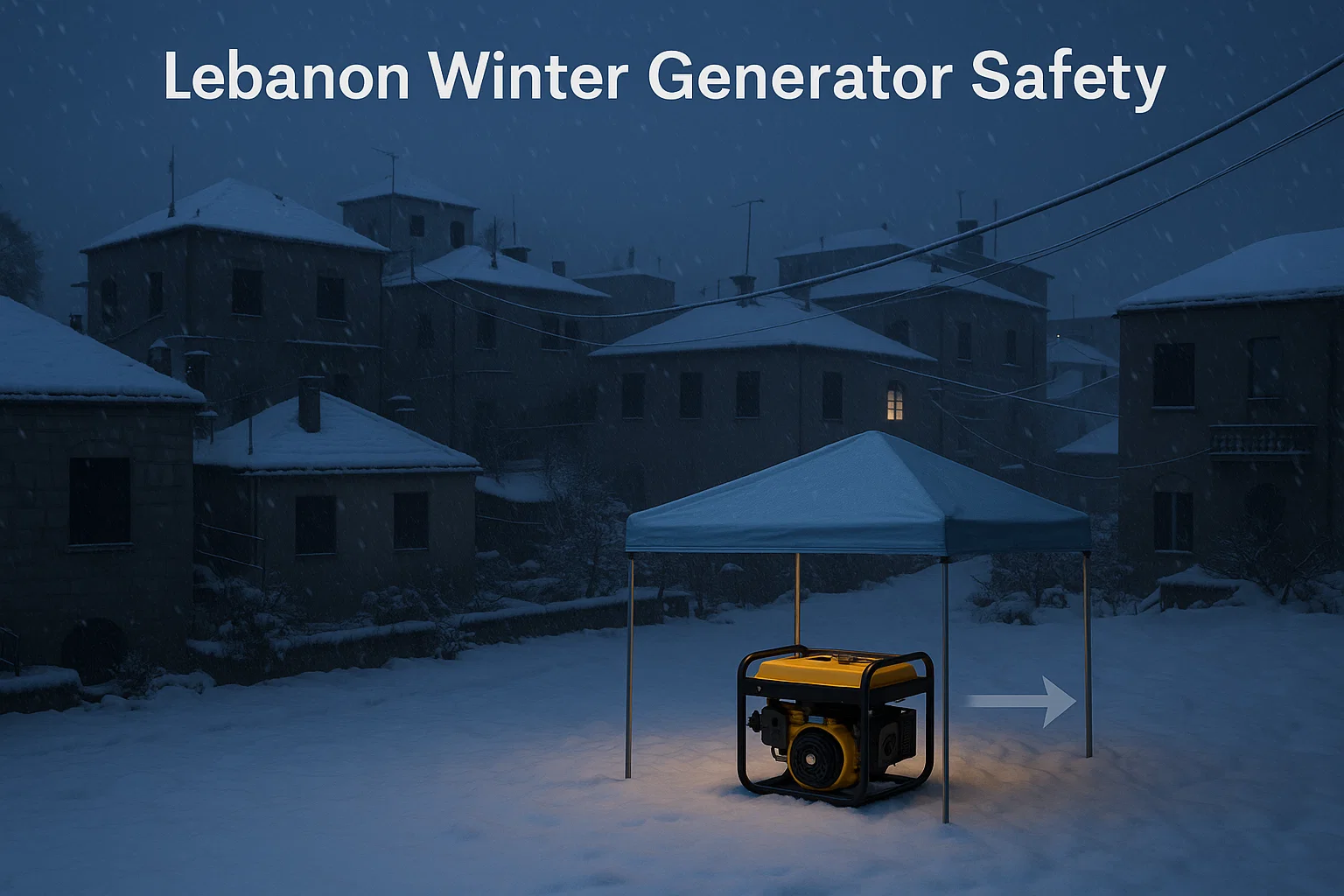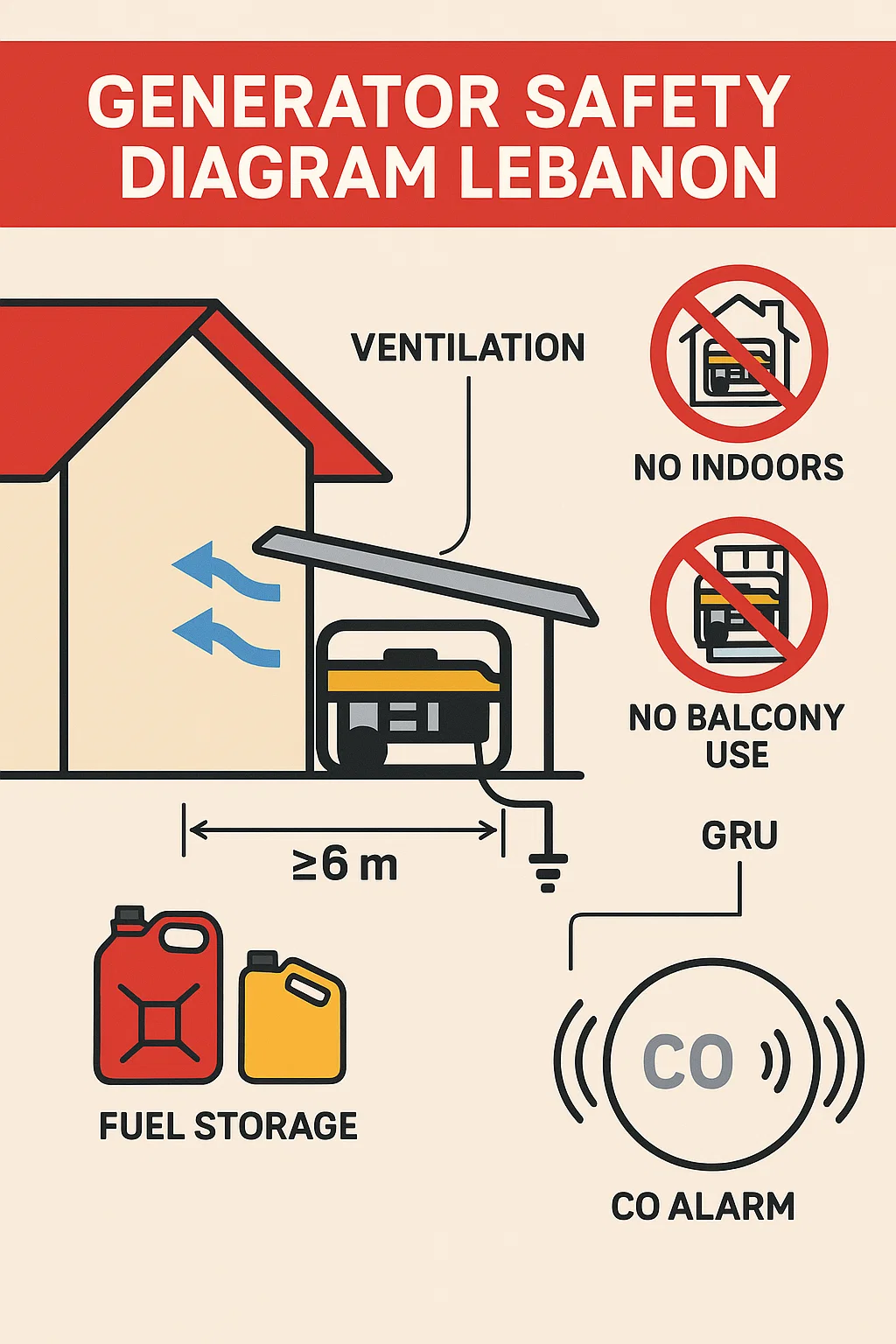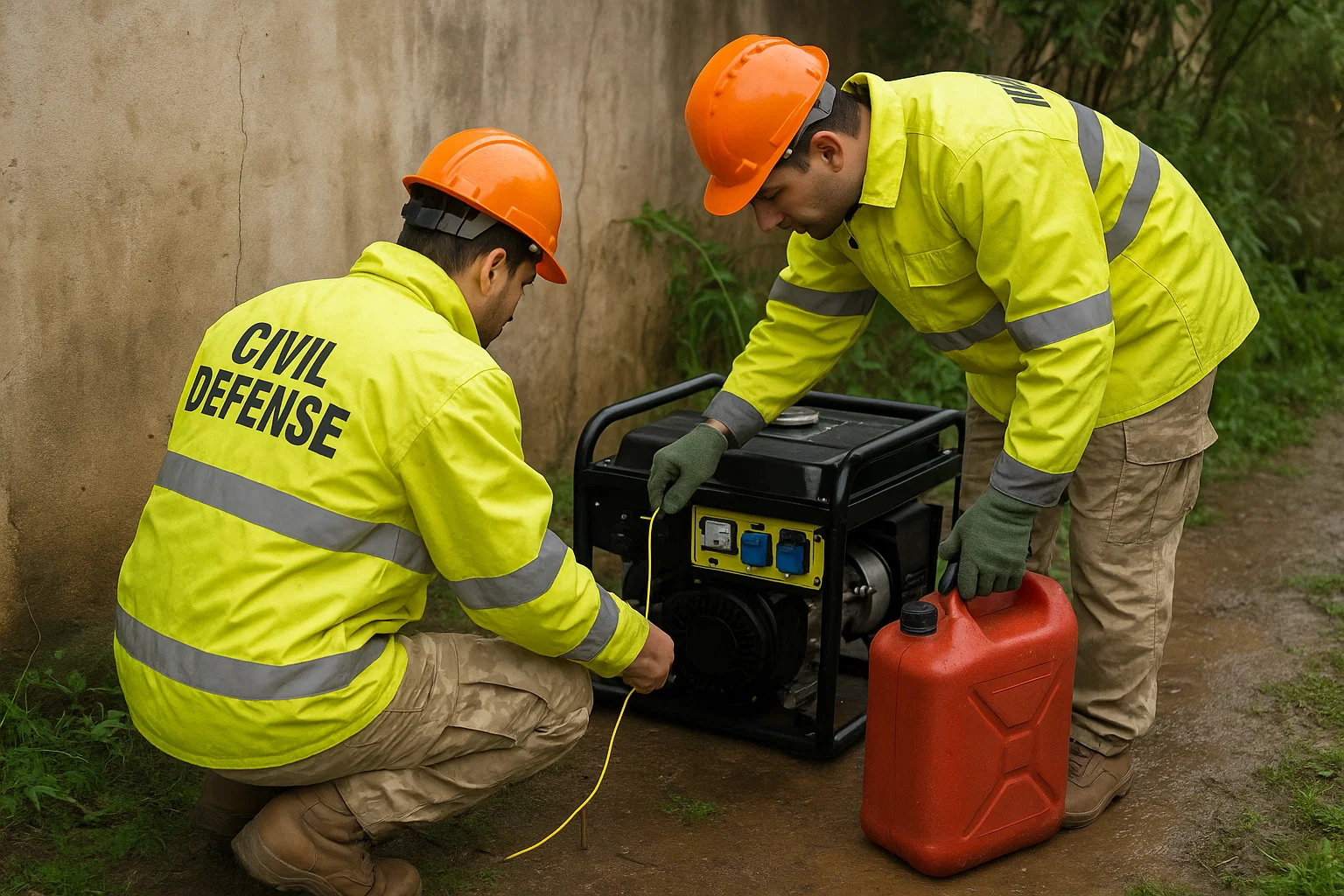
Here’s what matters. You want a generator that keeps the lights on, not a setup that turns into the next emergency call. The guidance below is built from NFPA standards, field experience, and the real issues Lebanese households face every storm season from unsafe balconies to makeshift fuel storage.
Let’s walk through everything that keeps your family safe.
Why Winter Storm Power Outages Are Risky in Lebanon
Lebanon doesn’t face light outages. We face outages that last hours, sometimes days, especially in the mountains, Akkar, Bekaa, Chouf, and rural South Lebanon. Most homes rely on:
- Private portable generators
- Building-shared diesel generators
- Small balcony-installed units (common, but dangerous)
- Extension cords running between apartments
- Improvised sheltering (nylon sheets, wood boxes, metal cages)
During a storm, temperatures drop, windows stay closed, people run heaters, and families crowd into small rooms. That combination makes CO accumulation faster and fire spread more aggressive.
Add heavy snow, water leaks, or pooling rain, and you get the perfect conditions for:
- electrocution
- short circuits
- grounded wires failing
- fuel vapor igniting
- CO-poisoning episodes
What you need now is a plan that keeps the generator safe before, during, and after a storm.
How Carbon Monoxide Becomes the Hidden Killer
You can smell diesel.
You can hear a generator misfiring.
But CO gives you nothing. Not a smell. Not a color. Not a sound.
Lebanon’s Civil Defense reports show CO poisoning as one of the top winter dangers from generators. The gas replaces oxygen in your bloodstream, silently disabling the body’s ability to absorb air.
The warning signs are extremely subtle:
- Headache
- Nausea
- Dizziness
- Heavy eyelids
- Confusion
- Weakness
Most victims never realize what’s happening.
Bottom line: If someone is sleepy near a running generator or heater, move them into fresh air immediately.
Safe Generator Placement for Lebanese Homes
Here’s the rule experienced responders repeat:
Winter or summer, the generator must never be indoors. Ever.
Lebanese households often place generators on:
- closed balconies
- stairwell landings
- inside building storage closets
- kitchens facing the balcony
- unfinished basements
Every one of these is unsafe.

Where to Place the Generator
Use this as your golden checklist:
- Minimum distance: 6 meters (20 feet) from all doors and windows
Snow or rain doesn’t matter the distance must be kept. - Always outdoors, with open ventilation on all sides
A yard, rooftop corner, or ground-level outside area works. - Under a hard, rainproof canopy not nylon sheets
Nylon melts, traps fumes, and increases heat. - Exhaust facing away from the house and neighbors
CO drifts into windows quickly in high wind. - Generator must sit on level, dry ground
Mud or standing water increases shock risk. - Shared building generators require fire-rated rooms
If your building generator sits in a storage room without ventilation, it should be corrected immediately.
Fuel Storage Safety The Part Most Homes Overlook
Lebanon’s storm seasons force families to store more diesel than usual. That creates a new hazard: fuel vapor.
A quick reality check:
Diesel doesn’t explode easily, but it ignites instantly under the right temperature and spill conditions.
Safe Storage Rules
- Use official, certified fuel containers not Pepsi bottles, not water gallons, not paint buckets.
- Store fuel outside the living space, away from heat sources.
- Keep fuel at least 3 meters from the generator itself.
- Never fill containers to the top diesel expands in cold/warm cycles.
- Don’t store containers indoors, especially not near heaters.
Refueling Safety
During outages, people refuel in a hurry. That’s when burns occur.
Remember these basics:
- Turn the generator off completely.
- Let it cool for 10–15 minutes.
- Never refuel with the exhaust hot.
- Use a funnel to avoid spills.
- Wipe any spilled fuel before restarting.
Electrical Safety During Storms
Water and electricity don’t negotiate. Lebanon’s winter storms bring heavy rain, freezing temperatures, and severe moisture the perfect combination for short circuits.
What not to do
- Do not run household wiring directly from the generator into wall sockets (“backfeeding”).
- Do not use cheap multi-plug strips for heaters.
- Do not let cords run through wet areas, puddles, or exposed rooftops.
- Do not overload the generator with heaters + refrigerator + water pump at once.
What you must do
- Use a heavy-duty outdoor extension cord rated for the generator’s output.
- Make sure connections are elevated off wet ground.
- Keep cords away from metal doors, wet floors, and sharp corners.
- Install a transfer switch if you want to power the house safely.
- Check grounding regularly loose grounding causes shock incidents.
Lebanon-Specific Generator Risks and Fixes
Different countries face winter storms. Lebanon faces winter storms with aging infrastructure, shared buildings, and tight living spaces. That changes the risk profile.
1. Balcony Generators
They trap fumes and heat. Move them outdoors, even if it means installing a small concrete pad or metal stand.
2. Shared Building Generators
Most lack proper ventilation. Buildings should have a fire-rated, ventilated generator room with two air openings: one high, one low.
3. Makeshift Metal Boxes
These trap fumes. Remove solid covers or replace them with ventilated canopies.
4. Apartment-to-apartment cables
This is common in cities. Use single, heavy-duty, grounded cables only, and keep them away from hallways where people may trip during evacuations.
5. Oversized heaters
Winter storms tempt families to connect heavy-load heaters. Match heater wattage to generator capacity.
Generator Safety Do’s and Don’ts
| Do | Don’t |
|---|---|
| Keep generator 6m away from home | Run generator on balcony or indoors |
| Use CO alarms in bedrooms | Block ventilation to “protect from rain” |
| Refuel only when cool | Refuel while engine is running |
| Use heavy-duty outdoor cords | Use cheap multi-plugs with heaters |
| Store fuel in certified containers | Use bottles or jerry cans without caps |
| Face exhaust away from windows | Point exhaust toward living areas |
Storm Readiness Checklist
Keep this list printed or saved on your phone before storm season:
Family & Home Readiness
- Working CO alarm
- Flashlights + spare batteries
- Portable radio
- Warm blankets
- Fully charged power banks
- Fire extinguisher (dry chemical, 2–4 kg)
Generator Readiness
- Full fuel container stored safely
- Engine oil checked
- Cords inspected
- Outdoor canopy secured
- Snow shovel or broom nearby
- Gloves and funnel for fuel handling
Storm Forecast Readiness
- Secure outdoor items
- Protect fuel from freezing rain
- Clear snow around ventilation areas
- Keep children away from generator zone
Pro Tip #1 Ventilation Matters More Than Temperature
People worry about rain damaging the generator. Rain won’t kill you. CO will.
Always prioritize open air, not sheltering the unit too tightly.
Fire Safety Measures Every Household Should Apply
Generators become unpredictable when storms escalate. A fuel spill gets blown onto the exhaust. A spark lands near a wooden balcony. A cable overheats behind a sofa. You need measures that reduce the consequences even if something goes wrong.
1. Keep a fire extinguisher close
A 2–4 kg dry-chemical unit works for fuel, electrical, and generator fires.
2. Maintain a clear 1-meter zone around the generator
No cardboard, no wood, no cloth covers.
3. Test smoke alarms twice a year
Winter is when they matter most.
4. Turn the generator off while sleeping
This rule alone has saved countless lives globally.
5. Install a CO alarm
One in the hallway, one near bedrooms. They cost far less than people think.
Pro Tip #2 Teach Every Family Member the Basics
Storm safety isn’t the job of one adult.
Make sure everyone knows:
- where the generator is
- how to shut it off
- what CO symptoms look like
- where the fire extinguisher sits
Kids can learn these don’t underestimate them.
Winter Storm Aftermath: What To Check Before Restarting the Generator
Storms leave behind hazards we don’t notice right away. Before you start the generator again:
- Check for water pooling near the unit.
- Inspect the exhaust for snow blockages.
- Make sure cords are dry and intact.
- Confirm no branches, debris, or metal pieces touched the frame.
- Look for any scorch marks or melted plastic near the outlet box.
If anything feels off, don’t start it. A machine that looks “a little strange” is usually giving you a warning.

Community-Level Safety for Lebanese Neighborhoods
Generators are everywhere. When every home runs one at the same time, the risks multiply.
Neighborhood agreements work
Some buildings and villages create storm-safety rules:
- Shared canopy to keep units dry
- Rotational generator use to reduce noise and fuel consumption
- Shared CO alarms for hallways
- A designated fuel storage area
- WhatsApp groups for storm updates and emergencies
These small steps increase neighborhood safety without costing much.
Training Your Building or Neighborhood Crew
If your neighborhood already has night guards or maintenance staff, train them on:
- Clearing snow/ice around generator zones
- Recognizing CO poisoning
- Basic fire extinguisher use
- Safe cable routing
- Fuel handling and spill control
Civil Defense often welcomes community education requests you can arrange small workshops before winter season.
How First Responders Treat Generator-Related Emergencies
Here’s how we typically approach generator incidents:
- Scene safety responders check for live wires, leaking fuel, or CO buildup.
- Ventilation doors/windows opened. Generator turned off.
- Remove victims to fresh air immediate oxygen support.
- Monitor CO levels specialized meters detect lingering gas.
- Fire suppression dry chemical extinguishers first, then cooling.
- Electrical isolation we cut power to prevent secondary shocks.
You can mirror these principles at home in emergencies.
FAQs:
1. Is it safe to run a generator on my balcony in Lebanon?
No. Balconies trap fumes, increase CO levels, and expose neighbors to risk.
2. Can my generator stay outside during heavy rain?
Yes but only under a solid, ventilated cover, not plastic sheets.
3. What’s the safest way to warm the house during a storm?
Use energy-efficient electric heaters matched to generator capacity or safe indoor gas heaters (with ventilation).
4. Do CO alarms really work?
Yes. They’re inexpensive and life-saving especially in winter.
5. Should I leave the generator running while I sleep?
Never. Turn it off. That’s a hard rule for winter safety.

Alex Smith, a seasoned medical technician with 15 years in ambulance services, writes crucial first-aid tips and emergency care insights on arescuer.com.
